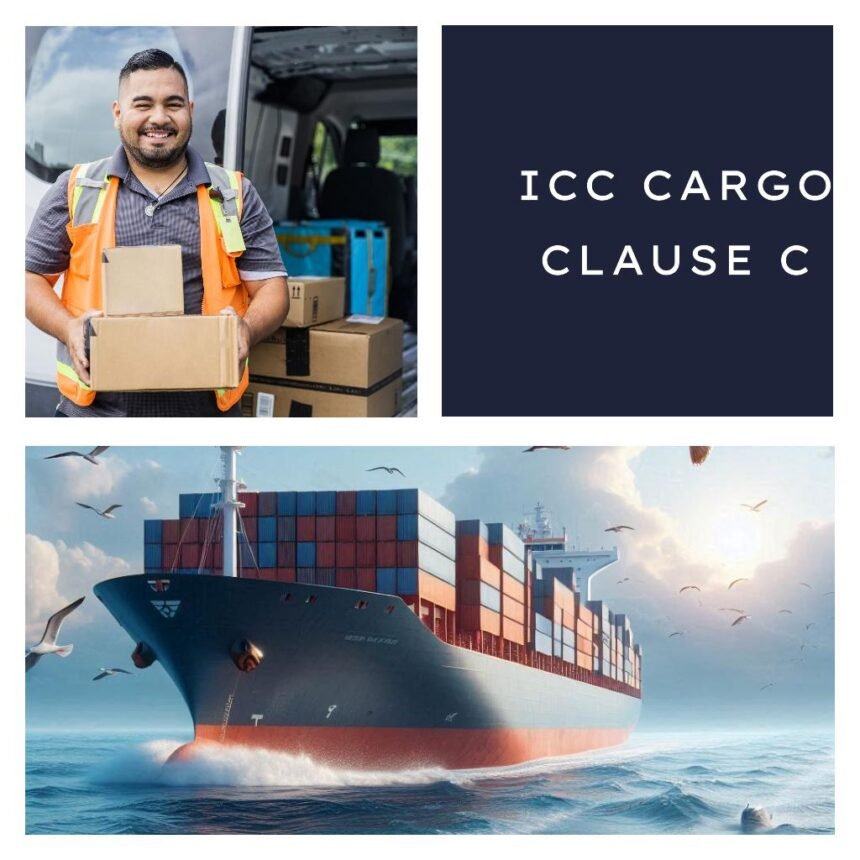Institute Cargo Clause (C) (ICC C) is a set of standard terms and conditions for marine cargo insurance, providing the most basic level of coverage compared to ICC A and ICC B. Here’s an in-depth explanation of ICC C:
Overview of Institute Cargo Clause (C)
Institute Cargo Clause (C) offers coverage for a limited number of specified risks. This type of policy is more restrictive and typically costs less, making it suitable for goods that are less valuable or less susceptible to damage during transit.
Scope of Coverage
The perils covered under ICC C include:
1. Fire or Explosion:
– Covers loss or damage due to fire or explosion during transit.
2. Vessel or Craft Stranding, Grounding, Sinking, or Capsizing:
– Covers loss or damage when the vessel or craft carrying the goods is stranded, grounded, sinks, or capsizes.
3. Overturning or Derailment of Land Conveyance:
– Covers loss or damage if the land conveyance (like a truck or train) overturns or derails.
4. Collision or Contact of Vessel, Craft, or Conveyance with External Object:
– Covers loss or damage due to collision with any external object other than water.
5. Discharge of Cargo at a Port of Distress:
– Covers the discharge of cargo at a port of distress, which may occur in emergency situations.
6. General Average Sacrifice:
– Covers the insured’s contribution to general average (a maritime law principle where all parties in a sea venture proportionately share losses resulting from voluntary sacrifices of part of the ship or cargo to save the whole in an emergency).
7. Jettison:
– Covers the throwing overboard of cargo to lighten the vessel in an emergency.
Additional Provisions
1. General Average and Salvage Charges:
– Coverage includes general average and salvage charges incurred to avoid or minimize loss or damage to the cargo.
2. Both to Blame Collision Clause:
– If the ship collides with another ship and both ships are to blame, this clause ensures that the cargo owner can recover their losses from their own insurer, who can then seek a proportionate recovery from the other ship’s insurer.
Exclusions
ICC C has specific exclusions similar to ICC B, including:
1. Willful Misconduct:
– Loss or damage due to the willful misconduct of the insured.
2. Ordinary Leakage and Wear and Tear:
– Ordinary leakage, ordinary loss in weight or volume, or ordinary wear and tear of the insured cargo.
3. Insufficiency or Unsuitability of Packing:
– Loss or damage caused by insufficient or unsuitable packing or preparation of the goods, unless packed by a third party without the knowledge of the insured.
4. Inherent Vice:
– Loss or damage caused by inherent vice (a natural characteristic of the goods that causes deterioration without any external cause).
5. Delay:
– Loss or damage caused by delay, even if the delay is due to an insured risk.
6. Insolvency of Carrier:
– Loss or damage resulting from the insolvency or financial default of the owners, managers, charterers, or operators of the vessel.
7. War and Strikes:
– Loss or damage caused by war, warlike operations, civil war, rebellion, revolution, insurrection, or civil strife. Additionally, losses caused by strikes, lockouts, labor disturbances, riots, or commotions are excluded unless separate War and Strikes clauses are added.
Duration of Coverage
The coverage under ICC C typically begins when the goods leave the warehouse or place of storage at the place named in the policy for the commencement of the transit, continues during the ordinary course of transit, and terminates on delivery to the final warehouse or place of storage at the destination named in the policy. It also ends if the transit is interrupted for reasons beyond the control of the insured or if the goods are sold or the interest in the goods is transferred.
Claims Process
1. Notice of Loss:
– Immediate notice should be given to the insurer in the event of loss or damage.
2. Survey and Documentation:
– A survey may be conducted to assess the extent of the damage. The insured must provide all relevant documentation, including the insurance policy, shipping documents, invoices, and evidence of the loss.
3. Adjustment and Settlement:
– The claim is adjusted and settled based on the terms of the policy, considering the insured value, extent of the damage, and any applicable deductibles.
Benefits of ICC (C)
– Cost-Effective:
– ICC C is typically less expensive than ICC A and ICC B due to its more limited coverage, making it suitable for less vulnerable goods or cost-conscious shippers.
– Specific Coverage:
– Provides coverage for clearly defined risks, which can be beneficial for certain types of cargo where these risks are most relevant.
Comparison with ICC A and ICC B
ICC A:
– Provides “All Risks” coverage, insuring against all perils except those specifically excluded.
– Offers the most comprehensive protection, suitable for high-value or particularly vulnerable goods.
ICC B:
– Covers a broad range of specified perils but is more limited than ICC A.
– Suitable for goods with moderate risk and value.
ICC C:
– Covers the least number of specified perils, focusing on major risks such as fire, explosion, and major accidents.
– Suitable for goods with lower risk and value.
Conclusion
Institute Cargo Clause (C) is the most basic form of marine cargo insurance coverage, insuring against a limited range of specified risks. While it does not offer the broad protection of ICC A or ICC B, it provides essential coverage for significant perils, making it a cost-effective option for insuring less vulnerable or lower-value goods. Understanding the terms, scope of coverage, and exclusions of ICC C is crucial for shippers to ensure their goods are adequately protected during transit.










